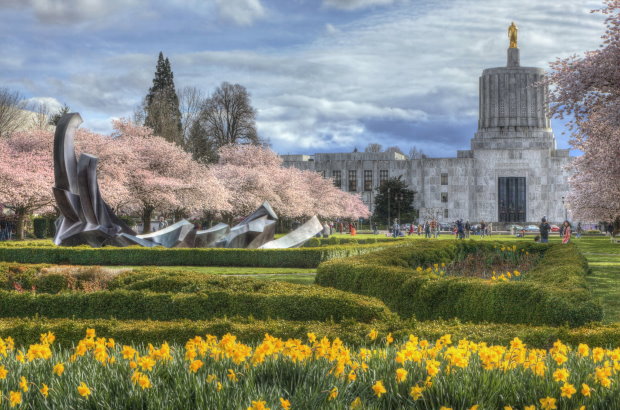What a wild ride 2021 has been already! In the face of multiple crises facing the state, Oregon’s legislature has been convening for its biannual “long session” since the end of January. It’s been a session like no other already, with remotely-held committee hearings requiring lots of reminders to mute or unmute participants along the way. But there have been some benefits, like residents from around the state being able to participate in the legislative process virtually without the long trek to Salem. One of the critical issues facing legislators this session: how much will they prioritize passing bills to reduce climate pollution and accelerate clean energy?
Download our CS 2021 Legislative Agenda
I’ll be the first to admit that the past few legislative sessions in Salem have been rough. Yet, we have new reasons for hope: an energetic and diverse new class of state legislators, an unprecedented level of public attention focused on the climate crisis, and the backdrop of new climate leadership in Washington, D.C.
In the face of major challenges, 2021 presents us with a unique opportunity—not only to address climate chaos, but also to tackle long-term systemic racism and the economic and public health crises that are disproportionately impacting people of color across the state and country. We can invest in our state’s clean and just recovery by passing new policies that help spur the transition to a clean energy economy and put people, our health, and our communities’ well-being first. This will chart a better course for Oregon and demonstrate our state’s strength and leadership in the region and country at this pivotal moment.
In coalition with many partners, the Climate Solutions team has been working hard to pass a 2021 legislative agenda tailored to meet this moment. This legislative agenda (available here) includes bills that transition Oregon to 100% clean energy, create tools to increase energy efficiency in our buildings, and accelerate the transition to zero emission transportation for all. We are also prioritizing many bills to help ensure our state’s transition to a clean energy economy is just and equitable.
As the historic wildfires that devastated Oregon last September and the most recent ice storms make clear, climate chaos is here and harming Oregon’s communities and well-being now. Despite this, the legislature has not successfully passed a major climate bill in five sessions now. Oregonians do not want to see any more delay or excuses. Even amidst the COVID-19 pandemic and hard economic times, recent polling confirms that 3 out of 5 Oregonians still support 100% clean energy. Collectively, we must demand our elected leaders prioritize climate action—not just to reduce climate pollution, but also because many pieces of climate action can actually help us add job opportunities and steer toward economic and social recovery. Let’s build back cleaner and more sustainably—starting now!
Here are brief summaries of Climate Solutions’ 2021 Legislative Agenda for Oregon:
Enact statewide commitment to 100% clean energy for all
Oregonians deserve cleaner air, energy independence, and community resilience. Fossil gas (from gas power plants and direct uses like heating and industry) is currently Oregon’s second-largest source of climate pollution. Legislation that requires our electric utilities to transition from fossil gas and coal to 100% clean and carbon-free power from sources like wind, solar and storage over the coming decades will help protect the air we breathe and our climate. A zero-emission electric sector will serve as the clean energy backbone to power our buildings, transportation, and industries. This policy, already passed by seven other states, will also generate economic development opportunities and family-wage jobs for clean energy, storage, and transmission projects.
Accelerate transportation electrification
The transportation sector is Oregon’s biggest source of climate pollution. Air pollution from this sector disproportionately harms low-income and Black, Indigenous and People of Color (BIPOC) communities. We must rapidly electrify our transportation sector in order to achieve our climate goals and improve public health for all Oregonians, as well as create good jobs.
- EV incentives (HB 2165): Extend state EV incentive program (set to expire in 2023), including low-income incentives for new and used EVs (Charge Ahead program). This policy also enshrines utilities’ role in installing EV charging infrastructure.
- EV-ready building codes (HB 2180): Require new residential, commercial and multi-family developments be built ready to support the installation of EV chargers.
Advance toward cleaner, healthier, more efficient buildings
Currently, many of the buildings in which we live and work waste energy, generate excessive pollution, and harm our health. We must ensure new buildings are super energy-efficient, powered by clean electricity instead of fossil fuels, and create good-paying jobs for the local workforce. Largely driven by local climate action goals, cities and counties are increasingly looking for ways to advance energy efficiency in buildings being constructed in their jurisdiction.
- Energy efficient local building codes (HB 2398; “Reach code” option): Authorize cities and counties to adopt the state Reach Code as their mandatory building code in their jurisdiction, ensuring new buildings are being built with stronger energy efficient standards.
- Appliance efficiency (HB 2062): Increase energy efficiency standards for new appliances consistent with other West Coast jurisdictions, reducing greenhouse gas emissions and saving money.
- Extend ETO (HB 3141): Extend the public purpose charge to ensure utility and Energy Trust of Oregon (ETO) programs for renewables and energy efficiency continue.
- Consumer Choice (HB 3106): Enable utility customer incentives for purchasing high efficiency electric appliances.
Facilitate a Just Transition to a clean energy economy
As we transition to a clean energy economy, our critical priorities are creating good family-wage jobs and economic opportunities across Oregon; addressing longstanding injustices; and ensuring that frontline communities are represented at all decision-making tables, prioritized, and benefit from clean energy investments.
- Energy affordability (HB 2475): Establish energy bill protections for low income utility ratepayers, and support frontline organizations’ engagement at the Oregon Public Utility Commission.
- Healthy Homes (HB 2842): Increase efficiency and weatherization of homes for low income families.
- Buy Clean/Buy Fair (HB 2688): Ensure public projects utilize sustainably-manufactured products.
- Equity and Climate in Land Use (HB 2488): Amends Statewide Land Use Planning Goals to 1) address climate change and reduce emissions, and 2) promote the participation of disadvantaged and historically underserved communities.
There will be numerous opportunities to make your voice heard and help ensure we take meaningful climate action in Oregon. Stay tuned for action alerts and other opportunities as we and our partners announce them.





